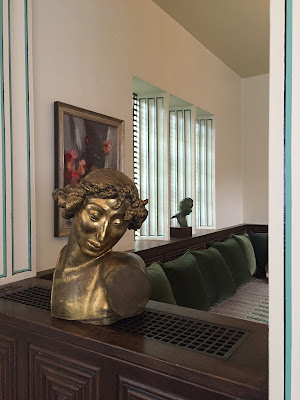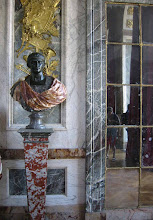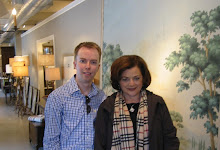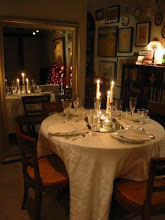Design runs in the family: the architect's wife was artist and weaver Loja Saarinen (who also taught at the academy) and their son would become well known industrial designer Eero Saarinen ( of the ubiquitous tables and chairs).
It was rather a gloomy day unfortunately but the snapshots capture the circa 1930 house well (I'll blog more on the rest of Cranbrook Academy later this week). Saarinen designed the president's house to fit within the compound and not stand out although great details abound: textured brick, leaded glass windows, etc.
Shall we go in?
The modern art deco interiors would have been unlike anything Detroit natives had seen in 1930 (perhaps with the exception of Frank Lloyd Wright's work). Saarinen brought the stream-lined style straight from Finland. One enters into a small stairhall where portieres (curtains at interior doorways) provide privacy between living spaces.As academy president Saarinen would have hosted academy functions at the house and even taught architecture classes in the studio which I'll show a bit later. The recessed mirror, furniture, and every detail were all designed by the Saarinens and have recently been magnificently restored. Until recently the Academy president still inhabited Saarinen house and many changes had been made over the ensuing decades. Now it operates strictly as a museum and was taken back to its 1930s appearance.
I loved the stepped ceiling detail with Saarinen's version of the now ubiquitous recessed light. These were all made on site.
To the left of the entry is the stair up to the family quarters as well as a cloak and powder room at the end of the hall.
The living room has been recreated from photographs with original furniture still owned by the Academy and the Saarinen family. All of the textiles were designed and woven by Luja.
Even the light fixtures and tile fireplace surround were designed by Eliel.
A small library nook is off the living room providing ample natural light; Notice the unique pendant fixture.
The cocktail table with an integrated globe was one of the more popular items of furniture, although hard to capture in the lighting.
Loved this sculpture on a zebrawood (?) plinth. All of the furniture was designed by Eliel and made on site utilizing high quality veneers.
Through another set of portieres sits the dining room. The wall paneling and recessed niches had all been covered over with drywall until recently but luckily sat undisturbed and in original condition down to the niche's red paint!
The table, designed by Eliel naturally, expands to seat 14. I loved the light fixtures a throughout the house which provide great ambient/indirect lighting.
While the kitchen has been long gone enough of the butler's pantry survived to be recreated down to the original refrigerator on the left! Notice the small pass through into the kitchen above the metal countertop.
Through portieres on another wall of the living room lies the studio where the Saarinens would meet students for classes. The first floor was a busy, working space much like the White House or any university President's house -not a private home!
The large and bright space would have been filled with drafting tables and such by day. They could all be pushed aside, the drawings stored in built-in cupboards, and the room quickly prepared for large events and parties.
A seating nook at the far end, closest to the living room, provides a more intimate seating area.
The students had a direct door into the studio from the architecture classroom building.
For parties this piano designed by Saarinen would provide endless fun.
As would this built-in record cabinet -the speaker is behind the fabric panel below.
The seating nook features textiles and rugs designed and woven by Loja. The artwork on the walls comes from numerous past presidents of the Academy and are not original to the time of the Saarinens.
The small green bust in the window beyond is of Eliel.
Up the staircase seen earlier in the post is the private family quarters. This seating nook was where the family could relax privately and had breakfast daily (toast and coffee only). 3 bedrooms in addition to the master bedroom provided quarters for 2 guests as well as their son Eero.
The art deco motifs painted on the doors were recreated from photographs.
The spacious master bedroom features another seating area as well as one of Eliel's most well known furniture designs -the tea height table with ample storage.
Twin beds are decorated with 30s era ruffled linens.
It surprised me that the very stream-lined Saarinen's (Loja in particular) would have ruffled curtains and bed linens which were so popular at the time period. The lamps and mirror on the dressing table in the window were designed by Eliel.
The window is flanked by built-in storage cabinets which feature pull out drawers broken into little cubbies. All of the dorm rooms on campus feature similar cubbies in drawers which students RAVE about years later as they provide for very organized storage; A cubby for each pair of socks, etc.
The original master bath is still in place! Given how small bathrooms of the time period generally were I was surprised to see such a large space. The room is as big as the bedroom and features separate his and her vanities, a separate water closet for the toilet, separate shower (seen above), and a large soaking tub in the center of the room.
The ceiling again features a telescoping design with Eliel's version of recessed lighting. The house is an art-deco gem; one expects Fred Astaire to come dancing into the room at any minute!
Tours are given daily but limited in size. If you ever find yourself in the Detroit area I would highly recommend a tour of this Masterpiece! See more on the website HERE.











































































.JPG)






































































